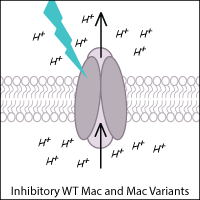Digital warrior. Dark->Light #GodWins #SaveTheChildren #TheGreatAwakening W҉W҉G҉1҉W҉G҉A҉ #17! #MAGA NowC@mesTHEP@in—-23!!!
Source https://t.me/Nate1776/24588
EMF Radiation?
ChristJesusisLord TwitterCriminal permanent suspension: Darlene@Darlene20503600 b/c I retweeted?? #SaveTheChildren !!
Le-Qing Wu and David Dickman from the Baylor College of Medicine have found neurons in a pigeon's brain that encode the properties of a magnetic field. They buzz in different ways depending on how strong the field is, and which direction it's pointing in.
We show that the artificial field through an attached magnet will quickly disrupt the birds' ability to distinguish pole-ward from equator-ward headings, but that much stronger fields are necessary to disrupt their ability to detect the magnetic axis.
We may finally know the secret to how migrating birds can sense Earth's magnetic fields: a molecule in their eyes called cryptochrome 4 that is sensitive to magnetism, potentially giving the animals an internal compass.
Magnetoreception (also magnetoception) is a sense which allows an organism to detect a magnetic field to perceive direction, altitude or location. This sensory modality is used by a range of animals for orientation and navigation,[1] and as a method for animals to develop regional maps. In navigation, like in bird migration, magnetoreception deals with the detection of the Earth's magnetic field.
Magnetoreception is present in bacteria, arthropods, molluscs, and members of all major taxonomic groups of vertebrates.[1] Humans are not thought to have a magnetic sense, but there is a protein (a cryptochrome) in the eye which could serve this function.[2]
thank you for being there
Wild-Type Mac
Leptoshpaeria schematic
Leptosphaeria rhodopsin (Mac) is a blue-green light-activated proton pump derived from the fungus Leptosphaeria maculans. Mac and its variants allow for inhibition of neurons using blue-green light.
Mac Variants. Mac variants have been engineered to include enhancements such as:
Improved photocurrent amplitude
Example: eMac3.0
😉👍🏻
excellent name
Gene Therapy and Light-Sensing Protein Restores Vision in Mice
Using gene therapy, a newly developed light-sensing protein called the MCO1 opsin restores vision in blind mice when attached to retina bipolar cells.
https://www.genengnews.com/news/gene-therapy-and-light-sensing-protein-restores-vision-in-mice/
Here, we report AAV2 assisted delivery of highly photosensitive multi-characteristic opsin (MCO1) into ON-bipolar cells of mice with retinal degeneration to allow activation by ambient light,” write the investigators.
“Rigorous characterization of delivery efficacy by different doses of AAV2 carrying MCO1 (vMCO1) into targeted cells showed durable expression over 6 months after delivery as measured by reporter expression.
COVID-19 Vaccine, AAVCOVID | Mass. Eye and Ear
Development of gene-based COVID-19 vaccine, AAVCOVID, underway at Massachusetts Eye and Ear and Massachusetts General Hospital.
https://masseyeandear.org/covid-19/vaccineAAV1 is the optimal viral vector for optogenetic experiments in pigeons (Columba livia) | Communications Biology
Although optogenetics has revolutionized rodent neuroscience, it is still rarely used in other model organisms as the efficiencies of viral gene transfer differ between species and comprehensive viral transduction studies are rare. However, for comparative research, birds offer valuable model organi..
https://www.nature.com/articles/s42003-020-01595-9Two papers published today in Science find birds actually have a brain that is much more similar to our complex primate organ than previously thought. ... The new findings show that birds' do, in fact, have a brain structure that is comparable to the neocortex despite taking a different shape.
Infectious-disease expert Margaret Chan, who hails from Hong Kong, has been nominated as the next director-general of the World Health Organization (WHO), based in Geneva, Switzerland. Chan, who has spent the last 18 months as assistant director-general for communicable diseases at WHO, is best known for her role in containing two fast-spreading viral outbreaks of bird flu and SARS in Hong Kong, where she was director of public health from 1994 to 2003. Her nomination, by the 34-member Executive Board, still needs to be ratified by the World Health Assembly tomorrow.
As Blind as a Bat? Opsin Phylogenetics Illuminates the Evolution of Color Vision in Bats | Molecular Biology and Evolution | Oxford Academic
Abstract. Through their unique use of sophisticated laryngeal echolocation bats are considered sensory specialists amongst mammals and represent an excellent mo
https://academic.oup.com/mbe/article/36/1/54/5200383Echolocation. Animals such as bats and dolphins send out ultrasound waves and use their echoes, or reflected waves, to identify the locations of objects they cannot see. This is called echolocation. Animals use echolocation to find prey and avoid running into objects in the dark
Quantum effect
The quantum dot mechanism of action is strikingly simple. While in the retina, the nanoparticles are stimulated by visible light entering the eye – and if a quantum dot is stimulated while it is in close proximity to a neural cell, it triggers an action potential in that cell which is interpreted as vision by the brain. Thus, the effect of photovoltaically active nanoparticles diffused throughout the retina is to electrically stimulate a large range and number of neuro-retinal cells.
polarity (n.)
1640s, "the having two opposite poles," originally of magnets, from polar + -ity. The sense of "variation in certain physical properties so that in one direction they are the opposite of what they are in the opposite direction" is from 1670s.
Ion channels are pore-forming membrane proteins that allow ions to pass through the channel pore. Their functions include establishing a resting membrane potential,[1] shaping action potentials and other electrical signals by gating the flow of ions across the cell membrane, controlling the flow of ions across secretory and epithelial cells, and regulating cell volume. Ion channels are present in the membranes of all cells.[2][3] Ion channels are one of the two classes of ionophoric proteins, the other being ion transporters.[4]


